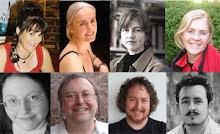
Love' em of hate 'em, a good agent can do a lot for your writing career. Many publishers say they only accept agented submissions. But how do attract an agent's attention and what can they do for you?
Over at the Mad Genius Club -- Writers Division, there's been a couple of posts about agents. Click here for Amanda Green's post, full of useful links to agents and sites about agents. And click here for Dave Freer's post on agents on why we need them.
Over at here Writer Beware Blogs Victoria Strauss is talking about dodgy agents.
Agent inBox is something a bit different.
'How does it work for agents? According to AgentInbox's FAQ for agents, agents create a profile listing their interests and submission preferences. They can then check their submissions online, sort them by various categories including genre, and "[r]eject unsuitable submissions with a single click, and contact the gems directly." ' Victoria Strauss comments on this idea here.
With evolving technology the publishing industry is going to change. Just how is anyone's guess. Here Victoria Strauss does a post about the perils of searching for a publisher using the internet.
And here is her post on 'Learning the Ropes'.
With the internet, you can do your research while sitting at home.
Here's my agent story. I applied for a grant to go to the World SF Con in Glasgow in 2005. My Australian agent had just retired and left me orphaned. Thanks to Arts Qld, I got the grant, flew to the UK.
Before I left I approached John Jarrold, offering to meet him at the World Con. (I thought I made me sound committed, coming all the way from Australia). I sent him the first 3 chapters of the trilogy he has since sold to Solaris. (King Rolen's Kin, due out in July 2010).
The day before I was due to meet him, I slipped into a panel where he was speaking. (Later he told me he recognised me, because he'd been to my web page to research me). At that panel he said he had been approached by over 500 hopeful writers and had taken on 13. My heart sank when I heard that. The next day when we had our meeting I was convinced he wouldn't offer to represent me. When he said he would, I felt like I'd been mentally derailed, in a very nice way. For the rest of the convention I was bobbing on air!
My story makes it sound easy, but I did approach a dozen or more agents before I went to the World Con and John Jarrold was the only one who offered to read my work. So there is an element of timing involved. Your work has to be good, it has to be marketable and the agent has to be looking to acquire authors.
So put yourself out there. The worst people can say is No. Does anyone else have an inspiring story to share?











